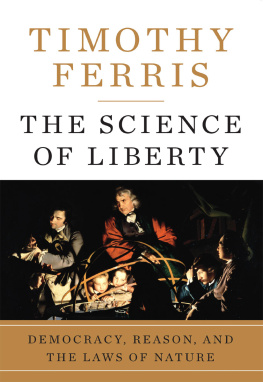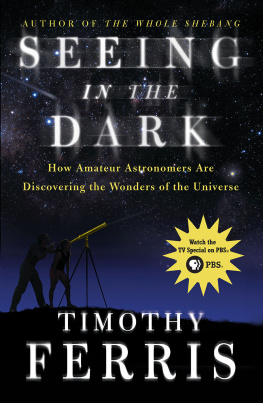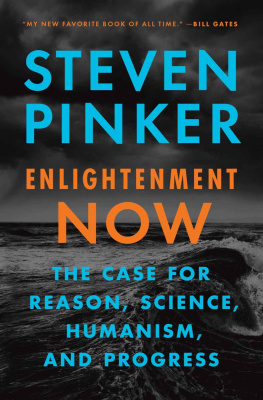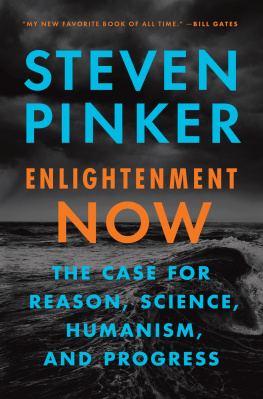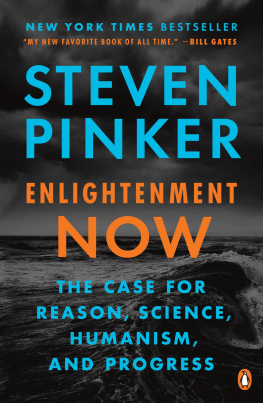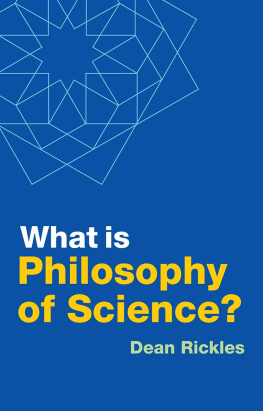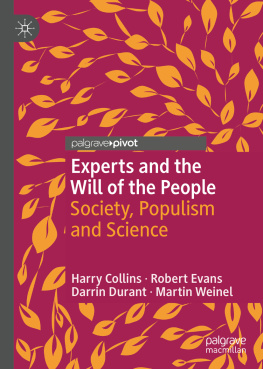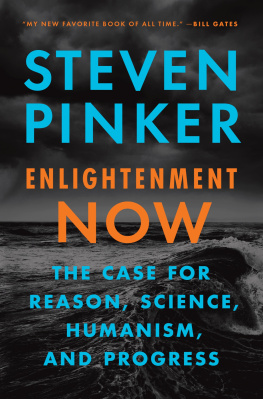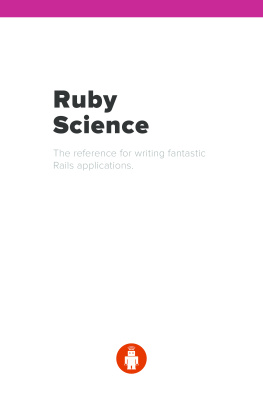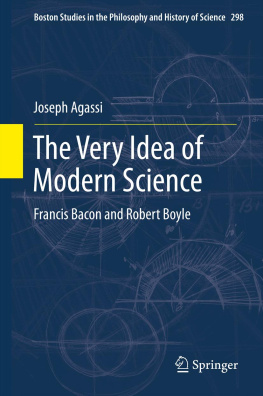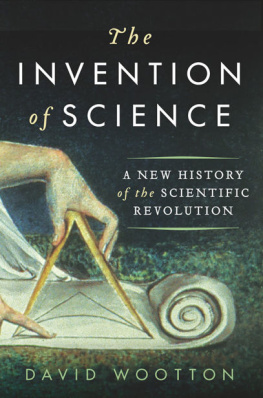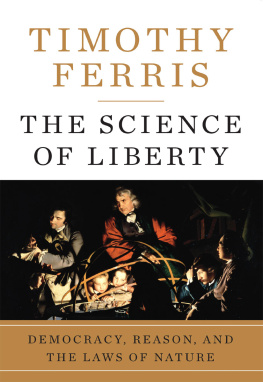IN MEMORIAM, H.S.T.
This poet had the foretaste of a vision, a great lust for which tormented his soul. From it he derived his great eloquence of desire and craving, lifting his readers above his work and all mere works and lending them wings to soar.
Great doubt: great awakening.
Little doubt: little awakening.
No doubt: no awakening.
SCIENCE & LIBERTY
Libertyis the great parent of science and of virtue; anda nation will be great in both, always in proportion as it is free.
THOMAS JEFFERSON TO JOSEPH WILLARD, 1789
Science as subversion has a long history.
FREEMAN DYSON, 1989
O ver the past few centuries, two transformationsone scientific, the other democratichave altered the thinking and the well-being of the human species. The scientific revolution is still gathering momentum, but has already revealed more about the universe than had been learned in all prior history, while technological applications of scientific knowledge have rescued billions from poverty, ignorance, fear, and an early grave. The democratic revolution has spread freedom and equal rights to nearly half the worlds inhabitants, making democracy the preference of informed peoples everywhere.
These two transformations were linked, and remain so today: Every scientific nation in the world at the close of the twentieth century was a liberal, or at least partly liberal, democracy (meaning a state that guarantees human rights to its citizens, who elect their leaders). But how are they linked?
The scenario most of us learned in school presents the transformation in three actsthe Renaissance, the Scientific Revolution, and the Enlightenment. In the Renaissance (meaning rebirth, from around 1450 to 1600), classical Greek and Roman writings became available to Europeans through trade with the Arab world, producing an outpouring of humanistic art and thought along with a few green shoots of scienceas when Copernicus in 1543 demonstrated that the motions of planets in the sky could as readily be explained by the earth orbiting the sun as by the old earth-centered cosmology. The resulting brew of humanistic and scientific thinking eventually produced the Enlightenment, which in turn sparked the democratic revolution: Hence the Enlightenment is often dated as beginning with the English Revolution of 1688 and ending with the French Revolution of 1789. Meanwhile there was for some reason a scientific revolution, and so the modern world emerged.
The traditional scenario works reasonably well as a framework of study, but it portrays the simultaneous rise of science and liberal democracy as little more than a series of coincidences. The situation becomes clearer if we ask what was new: What was the innovative ingredientthe crystal dropped in the supersaturated liquid, suddenly solidifying itwithout which the democratic revolution would not have occurred?
This book argues that the new ingredient was science. It maintains that the democratic revolution was sparked caused is perhaps not too strong a wordby the scientific revolution, and that science continues to foster political freedom today. Its not just that scientific creativity has produced technological improvements, which in turn have enhanced the prosperity and security of the scientific nations, although that is part of the story, but that the freedoms protected by liberal democracies are essential to facilitating scientific inquiry, and that democracy itself is an experimental system without which neither science nor liberty can flourish.
To investigate this proposition and its implications, this book attempts to do three things.
First, it explores the historical link between science and liberty from the Renaissance through the end of the eighteenth century, examining science as an ongoing enterprise that requires freedom of speech, travel, and association. It maintains that scientific skepticism is corrosive to authoritarianism, and that scientific experimentation provides a better model for governance than any of the systems that preceded it.
Second, the book traces the development of the democratic and scientific societies from the eighteenth century onward, to see how the ideas and practices of science influenced their social policies. To some extent this amounts to testing the argument by making retroactive predictions about what should have happened if, indeed, science promotes liberty and democracy. Admittedly such a process is fraught with potential for abuseanyone today, knowing how things turned out, can sift through the evidence for facts which suit his casebut such are the hazards of history.
Finally the world today is examined by the lights of science and libertytaking into account powerful antiscientific forces that have cast shadows across our timesrevealing, amid a welter of problems, surprisingly ample grounds for hope.
The word science comes from the Latin scientia , meaning knowledge. In that broad sense of the word Anaximander of Miletus may be called a biologist for having proposed, in the sixth century BC, that humans were descended from fish, and Aristarchus of Samos an astronomer, since he hypothesized in the third century BC that the earth orbited the sun. The trouble with this approach is that it makes a scientist out of any philosopher who happened to voice a reasonably accurate opinion on a subject that has since become a science. To speculate and be proved right is not in itself to do science: As the American philosopher Alfred North Whitehead noted, Everything of importance has been said before by somebody who did not discover it. The essence of science is experimentation, and scientific experiments were carried out by only a few ancient thinkers, among them Eratosthenes of Cyrene, who made a geometrical measurement of Earths diameter in the third century BC; Strato of Lampsacus, who experimented with vacuums and compressed air at about the same time; and Galen, who dissected animal and human corpses a bit later. So for the sake of clarity this book uses the term science to mean what is often called modern sciencethat is, research involving observation and experiment, conducted as an ongoing social enterprise by career scientists working in laboratories and contributing to professional conferences and journals.
Liberty means the observance of human rights and freedoms. In practice the governments that have done so have almost all been liberal democracies, so the rise of liberty is roughly equated with the rise of liberal democracy. This process got off to a slow start, but has accelerated during the last hundred years. In 1900 there was not a single liberal democracy in the world (since none yet had universal suffrage); by 1950 there were twenty-two. As of 2009, despite recent reversals, there were eighty-nine democracies, comprising 46 percent of the world population.
The claim that science flourishes only in liberal-democratic environments rests on five assertions.
First, science is inherently antiauthoritarian. In order to qualify as scientific, a proposition must be vulnerable to experimental testing. If it repeatedly fails such tests it tends to fall by the wayside, regardless of who supported it or how much it may have seemed to make sense. The verdict of experiment has rudely dismissed the pronouncements of great thinkers from Aristotle (who thought that men and women were born with a different number of teeth) to Einstein (who insisted that quantum physics must be deterministic), and has sufficed to unhorse the claims of alchemists who sought to turn lead into gold and the folk wisdom behind a thousand racial, ethnic, and sexual stereotypes. The very process of doing first-rate scienceof making important discoveries rather than merely refining old ideasdepends on unfamiliar and sometimes unpopular ideas being freely promulgated, discussed, and in some instances accepted. The fact that millions of people today are open to new ideas and skeptical about political or intellectual authority is largely due to the rise of science.

